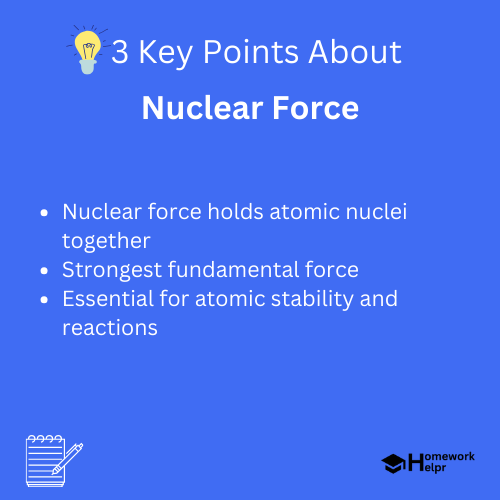📝 Summary
Nuclear force is a fundamental interaction in physics that holds the atomic nucleus together. Also known as the strong nuclear force, it binds protons and neutrons, or nucleons, and is vital for the stability of atoms. Its characteristics include a very short range, immense strength, and independence from electric charge. By controlling atomic stability, the nuclear force underpins essential phenomena, including chemical reactions and energy production in stars. Understanding this force enriches our appreciation of matter, energy, and the universe.
Nuclear Force: Understanding the Fundamental Interaction
In the vast realm of physics, one of the most fascinating interactions is the nuclear force. This force is crucial for holding the components of an atomic nucleus together. To appreciate the significance of the nuclear force, one must delve into the structure of atoms and the principles that govern atomic behavior.
What is the Nuclear Force?
The nuclear force, also known as the strong nuclear force or strong interaction, is one of the four fundamental forces in nature, alongside gravity, electromagnetism, and the weak nuclear force. It is the force that binds protons and neutrons, collectively known as nucleons, within the nucleus of an atom. Given its critical role, it is essential in determining not only the stability of the nucleus but also the behavior of elements in chemical reactions.
Definition
Nuclear Force: The strong attractive force that acts between nucleons (protons and neutrons) in an atomic nucleus.
Characteristics of the Nuclear Force
The nuclear force exhibits unique characteristics that set it apart from other fundamental forces. These include:
- Range: The nuclear force has a very short range, typically effective at distances of about 1 femtometer (10-15 meters), approximately the size of nucleons themselves.
- Strength: It is the strongest of all fundamental forces but only acts at very short distances.
- Charge Independence: The nuclear force is almost independent of the charge; it acts equally between proton-proton, neutron-neutron, and proton-neutron pairs.
These features are vital for maintaining the stability of atomic nuclei across various elements, preventing them from breaking apart due to repulsive electromagnetic forces between protons.
Examples
The stability of helium nuclei (two protons and two neutrons) is primarily due to the strong nuclear force overshadowing the repulsive forces among protons.
The Role of Quarks and Gluons
To further understand the nuclear force, one must consider the subatomic particles involved—specifically, quarks and gluons. Quarks are the building blocks of protons and neutrons, and they are held together by particles called gluons, which mediate the strong force.
This interaction can be summarized by the following equation:
where g represents a constant that encompasses the strong force, q_1 and q_2 are the properties of the interacting quarks, and r is the distance between them.
Why Nuclear Force is Important
The nuclear force is indispensable for various phenomena in physics and chemistry. It ensures atomic stability, which is essential for the existence of matter as we know it. Without this force, atomic nuclei would be unable to hold themselves together, leading to:
- Instability of elements: Many elements would become radioactive without a stable nuclear structure.
- Absence of complex molecules: Life as we know it would not exist, as essential molecules like DNA, proteins, and carbohydrates rely on stable atomic structures.
- Energy storage in stars: Nuclear fusion processes powered by the strong force power our sun and other stars, producing the energy necessary for sustaining life on Earth.
❓Did You Know?
Did you know that nuclear forces are responsible for the tremendous energy released during nuclear fission and fusion? This energy is used in both nuclear power plants and atomic bombs!
Nuclear Force vs. Other Fundamental Forces
The nuclear force is just one of the four fundamental forces that govern interactions in the universe. Each force has different characteristics and ranges:
- Gravity: The weakest force but has an infinite range. It governs the attraction between massive bodies.
- Electromagnetic Force: This force acts over infinite distances and is responsible for electric and magnetic interactions. It can be both attractive and repulsive.
- Weak Nuclear Force: Responsible for radioactive decay and neutrino interactions, it has a very short range, like the nuclear force but is much weaker.
Understanding the differences between these forces is critical for grasping the complexity of physical interactions in the universe.
Applications of Nuclear Force
The implications of the nuclear force extend beyond just the atomic level; it plays a pivotal role in various fields, including:
- Nuclear Energy: Harnessing nuclear fission, where the nuclear force is essential for splitting heavy nuclei, can produce vast amounts of energy.
- Medicine: Techniques like radiotherapy exploit the principles of nuclear decay, leveraging the behavior of unstable isotopes.
- Astronomy: Understanding star formation and stability necessitates a grasp of strong nuclear forces and their influence on nuclear reactions.
Examples
The energy from the sun comes from nuclear fusion, where hydrogen nuclei combine under immense pressure and temperature, resulting in helium and releasing vast amounts of energy.
Conclusion
In summary, the nuclear force is a fundamental aspect of the physical world, playing a crucial role in atomic stability and the interactions between subatomic particles. By understanding this force and its characteristics, we can better appreciate the complexities of matter, energy, and the universe.
From powering stars to enabling life on Earth, the implications of the nuclear force are profound and far-reaching. As students continue to explore the universe, a firm grasp of the nuclear force lays the groundwork for a deeper understanding of both physics and chemistry.

Related Questions on Nuclear Force
What is the nuclear force?
Answer: It is the strong attractive force among nucleons.
What particles mediate the nuclear force?
Answer: Gluons mediate the strong force between quarks.
Why is the nuclear force important?
Answer: It ensures atomic stability and supports life.
What are the applications of nuclear force?
Answer: Used in nuclear energy, medicine, and astronomy.
